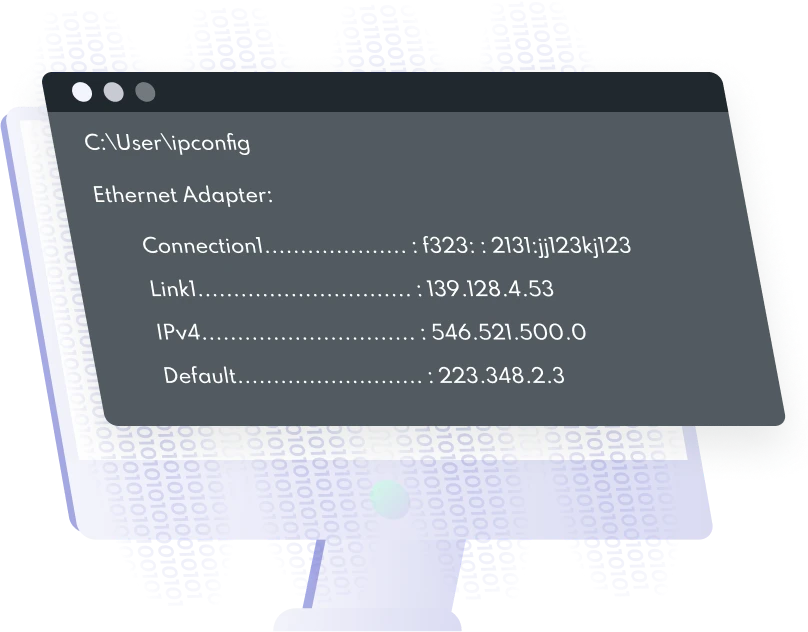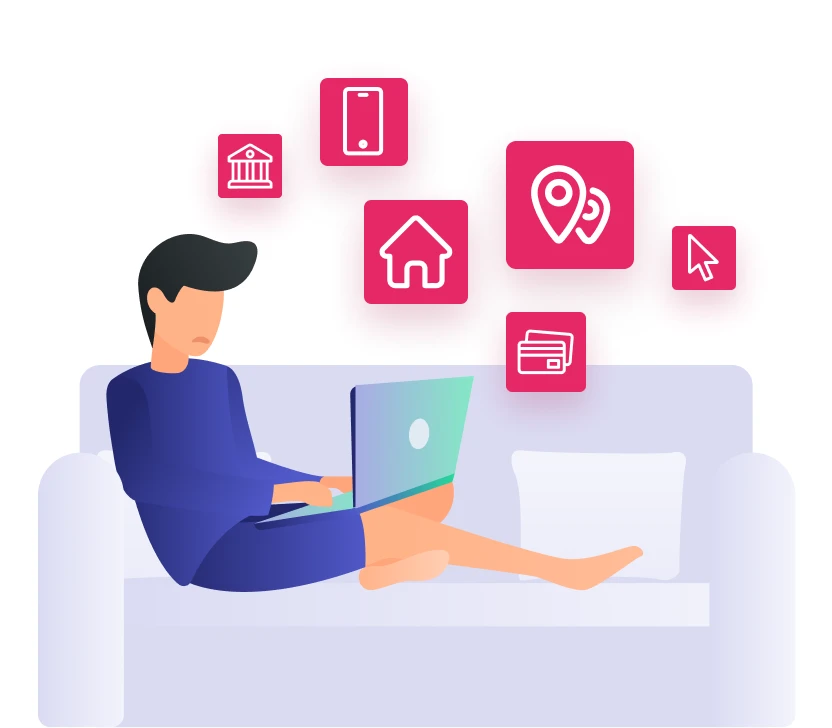What Is My IP Address?
What’s my location?
Check your location online.
It’s easy to get information about you online with your IP address.
What is an IP Address?
Learn what an Internet Protocol Address is and why it’s so important to keep your IP address private online using a VPN.
The Internet Protocol address is how your computer, phone, tablet, or any other device is identified on the Internet. Every IP address is attached to specific information including where it is located, what Internet service provider (ISP) is running it, how long it's been used, and more.
PrivadoVPN protects your private data by changing your IP address. Everything is sent through one of our VPN servers first so nobody can see where you are physically located, your personal information is encrypted, and your identity stays hidden. Since we are a no-log VPN, we keep no records of your Internet activity, so your data stays secure and private, even from your own ISP.

Why You Should Hide Your IP Address with a VPN
A VPN keeps you anonymous online by changing your IP address. This prevents anyone from being able to easily see your location, ISP, or other private information. It also lets you virtually locate yourself anywhere in the world.
PrivadoVPN hides your IP address and protects you.
Ad Blocker
Ads that track your IP address can follow you around the Internet, slowing down your connection and putting your personal information at risk. PrivadoVPN stops that.
Online Anonymity
Keep yourself anonymous online by connecting to an encrypted VPN server. Not only does this protect your identity, but it also hides your activity, even from your own ISP!
WiFi Connection Security
Whether you’re at home, at work, or using public WiFi, you get a secure connection that maintains your privacy. PrivadoVPN uses advanced VPN protocols to keep you hidden online no matter where you are.
What Can an IP Address Show?
See what your IP exposes to others online.
IP addresses are attached to potentially sensitive information about you that can be accessed very easily. Because IP addresses are sold to public ISPs, knowing your IP can make it easier to find out all sorts of data about you including your:

At PrivadoVPN, we buy IP addresses right from the ISPs. Because we don’t keep logs of your private Internet activity, none of that information is connected to you. Your real IP address also can’t be tracked or sold to marketers.
What is a Public IP Address?
What is a Private IP Address?
The difference between a public and private IP address is that the first is your IP address for the whole Internet, and the second is your IP address on your local network.

What are Public IP addresses?
What are Private IP addresses?
Which IP address do I need?
That’s why it’s so important to use a VPN that will hide your IP address and encrypt your data. Sign up for PrivadoVPN today to keep your private information safe.
Hide Your IP AddressIPv4 vs IPv6: What’s the Difference?
There are two versions of IP addresses: IPv4 and IPv6. There are different formats and different purposes for each.

IPv4
IPv4 is the primary addressing system used by approximately 94% of Internet-connected devices. It uses four numbers separated by periods and ranging from 0 to 255. This allows it to generate over 4 billion unique IP addresses.
Unfortunately, we are quickly reaching a point when they won’t be enough.

IPv6
Originally developed in 1994, IPv6 uses 8 sets of four digital characters separated by colons. These can be numbers or letters, allowing IPv6 to generate up to 340 undecillion IP addresses for connected devices.
IPv6 has been undergoing extensive testing for decades to ensure than any changeover will be smooth and bug-free.
Why Isn’t IPv6 Standard?
IPv6 is a more advanced technology that will better serve our needs in the future, but there are a few reasons why only about 6% of devices use it.
- 1 IPv6 devices aren’t backward compatible with IPv4. So far there is no solution to this, and there might never be. But shifting to IPv6 would likely require a period of redundancy where websites, for example, would need to be available on both protocols at once, which could create a lot of technical and financial issues.
- 2 IPv4 still works. It’s rare that large-scale changes are undertaken until they absolutely must be because the effort required to make them is so great. We haven’t yet reached a point where there aren’t enough IP addresses available, so it’s unlikely that the changeover will happen until that point.
- 3 IPv4 is critical to the operation of the entire Internet. Changing IP protocols isn’t as simple as flipping a switch. A single bug could literally take down the entire Internet if we rush the implementation of IPv6. Even 30 years on, it’s still functionally “new technology,” and we can’t risk the most important communication tool in history without extreme caution.
Until a more secure system is put in place, you should always connect to a VPN to hide your IP address and protect your privacy online.
Hide Your IP AddressFrequently Asked Questions
Why do my online devices need an address?
Every time you access a website or service, the first thing your computer does is try to find it. But, just like in real life, where it would be impossible to find somebody without their address, computers also need to know exactly where to find what you're looking for.
It does this with a series of numbers called an IP address. The IP of every device on the Internet is registered with The Internet Corporation for Assigned Names and Numbers (ICANN). They are a nonprofit organization that keeps track of what every IP address is, where it is located, and what domain names are assigned to them. From ICANN, other servers are fed this information to keep everybody up to date on how to access online services.
Without an IP address, your device couldn't be located online, so it couldn't be sent the data it requested, like the website you want to look at or the movie you're trying to stream.
You might then wonder, “What is my VPN going to do to help?”
With a VPN, you can make your connection more private, hiding your public information behind secure addresses. Your IP is secure, masked by our IP addresses.
How do I keep my IP private?
The easiest way to hide your IP address is to use a VPN to "mask" your IP. IP masking means hiding your true IP address by first connecting to a VPN. Once you're connected to a VPN server, all your data is routed through those IP addresses. Instead of directly asking for information, you ask the VPN to get the data for you. The VPN server makes the requests using its IP address, and you get to remain anonymous. This is the best way to protect the privacy of your Internet connection.
Can somebody find my location with an IP?
Yes, it is trivially easy for people to find out at least your general location if they have your IP address. And with the extra information that an IP might contain, somebody could find your actual address, your passwords, even your social security number.
Masking your IP addresses with a VPN is crucial to keeping your personal information safe and secure.
How do I hide my location online?
It's very easy to hide your location online and defend your privacy. The simplest way to keep your location private is to connect to a virtual private network (VPN).
When you connect to the VPN server, you have limited how many outside computers will know your true IP address to only one: that specific VPN server. From that point, you tell the VPN what you want, and the VPN collects the information on your behalf, passing it safely back to you through its IP addresses. It's like sending a personal assistant out on errands for you. Nobody sees you buying clothes or banking, they only see the assistant. Your privacy remains intact.
This is especially helpful when it comes to things like file transfers that directly connect two or more computers into a cluster that can easily see the IP address of every other device in the cluster.
What is the difference between IPv4 and IPv6?
When the Internet was first conceived, nobody could have guessed how popular it would be, or what an important part of our lives it would become.
IPv4 is the first deployed version of the Internet Protocol and uses a 32-bit address scheme that generally looks like this: 192.168.1.1. It applies to both public and private connections. When this was created, scientists didn't think we would need more than the approximately 4 billion permutations that that sort of scheme allows, and it's lasted quite some time. In fact 94% of Internet traffic uses IPv4 to track the location of devices online. But we are rapidly approaching a point where more than 4 billion devices might access the Internet at once, and all of them need an IP.
IPv6 is a major improvement on IPv4 and more forward looking. It uses a 128-bit, alphanumeric scheme to address devices online. This method allows up to 340 undecillion addresses to be used at once.
“So, why isn't my IP IPv6 now?“
There are a couple of reasons. The first is that the Internet is huge and very important. Like an enormous ship, it can't turn on a dime, so even though IPv6 was invented in 1994, it will take a long time to implement it. Also, this is the fundamental code of the most powerful communication tool ever created: they have to be careful that there are no bugs or the results could be catastrophic.
In its current form, IPv6 also can't do a lot of what IPv4 can. In some cases, computer scientists are working on ways to make the new protocol handle the same things as the old one. In other cases, IPv6 actually accomplishes tasks in a superior way to IPv4, so we have to wait for those methods to become more mainstream.
That being said, IPv6 is coming. My IP, yours, everyone's will be using this protocol.
What is an Internet Protocol Leak?
An IP leak is when your true IP address, with the associated private data, is visible to third parties. Many security tools are meant to prevent an IP leak, but may still allow your public activity to be seen. Even a few seconds of vulnerability can reveal banking logins, your social security number, or other important data.
A VPN can help prevent an IP leak from happening by making sure that all of your data is encrypted and travels through secure servers. With a VPN, you are protecting all of your private data end-to-end, making sure that a potential leak never has the chance to happen.
You should also make sure that your DNS server isn’t leaking by using our DNS leak test. If there are, you can switch to using secure DNS addresses through PrivadoVPN.
Don’t risk your private data on insecure connections. Always use a VPN when you’re surfing the Internet and keep your IP addresses safe.